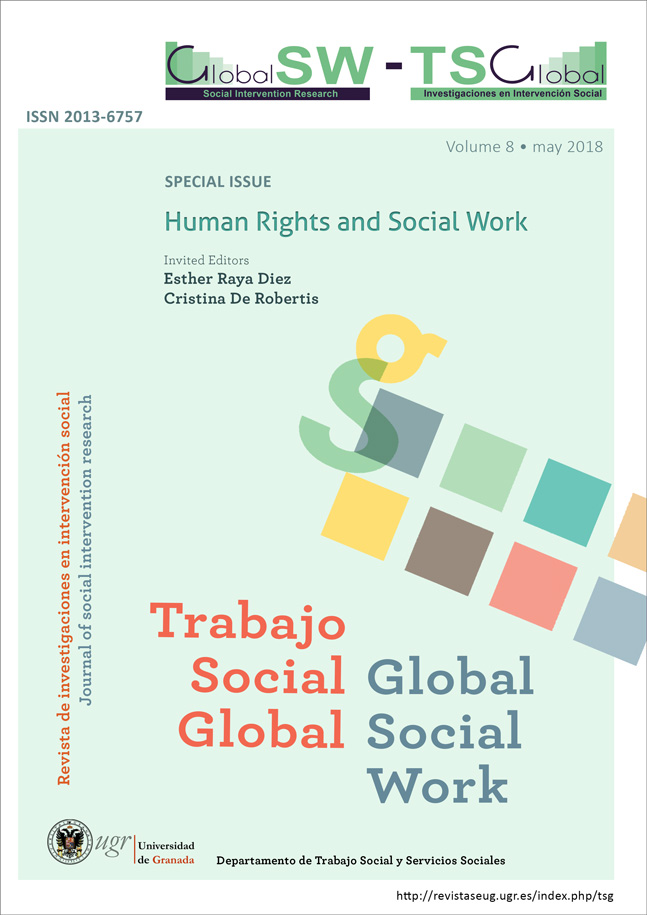Human Rights, guiding principles for the practice of Social Work
DOI:
https://doi.org/10.30827/tsg-gsw.v8i0.7258Keywords:
Human rights, ethical principles, concept of person, professional practiceAbstract
Human rights are essential in social work, they give the bases of the same conception of the profession and influence practice every day. The current return to an ethical interrogation shows us that it is necessary to revisit the basics, remind us of the bases and take support on them to carry out a difficult and committed work. Revisit the values that sustain the practice and give sense in this context is today essential. In this article, I propose to reflect on three points. The first is human rights as forming an inseparable part of social work, we will see the humanist and democratic values and operative principles of the helping relationship. The second introduces the concept of person as the purpose of social work, the definition of the concept and the current guidelines towards a greater participation of users. The third outlines the roads leading from the principles of human rights to professional practice: change our look, mobilize resources and create new possibilities.
Downloads
References
Biestek, F. P. (1966). Las relaciones de « casework». Madrid: Ed. Aguilar.
Bouquet, B. (2012). Ethique et travail social (12ª Ed.). Paris: Dunod.
Breton, M. (2000). Partenariats et travail communautaire. Informations Sociales, 83, 38-49.
Castel, R. et Martin, C. (dir.). (2012). Changements et pensées du changement – échanges avec Robert Castel. Paris: La Découverte.
Cholet, P. (2000). CCAS : travailler sur l’articulation. Revue Informations Sociales, 83, 50-57.
Conseil Supérieur du Travail Social (2007). L’usager au centre du travail social. En CSTS (dir). Le travail social confronté aux nouveaux visages de la pauvreté et de l’exclusion. Rennes, France: Éditions ENSP. [Ver también : de Robertis, C. (2007). Les rapports du conseil supérieur du travail social (note de lecture). La revue française de service social, 226].
______________ (2014). Intervention sociale d’aide à la personne. Rennes, France: Presses de l’EHESP.
______________ (2015). Refonder le rapport aux personnes, « Merci de ne plus nous appeler usagers » Recuperado de
https://www.onpes.gouv.fr/IMG/pdf/Rapport_CSTS.pdf
Constitution du 1946, IVe Répiblique. Assemblée nationale constituante, 27 octobre 1946. Recuperado de http://www.conseil-constitutionnel.fr/#
Constitution du 4 octobre 1958, Ve République. Loi constitutionnelle du 3 juin 1958. Recuperado de http://www.conseil-constitutionnel.fr/#
De Robertis, C. (2005). L’accompagnement: une fonction du travail social. La Revue Française de Service Social, nº 217. Paris: ANAS.
____________ (2014), Participation des personnes : quelle contribution de l’intervention sociale d’intérêt collectif? La revue française de service social, 255, 57-63. Paris: ANAS.
De Robertis, C., Orsoni, M., Pascal, H. et Romagnan, M. (2014). L’intervention sociale d’intérêt collectif: de la personne au territoire. Rennes: Presses de l’EHESP.
Federación Internacional de Trabajadores Sociales (2012) Statement of Ethical Principles. Recuperado de . http://ifsw.org/policies/statement-of-ethical-principles/
Goffman, I. (1975). Stigmate; les usages sociaux des handicaps. París: Les éditions de minuit.
Hessel, S. (2010), Indignez-vous ! Montpellier: Indigène éditions.
Kant, E. (1989). Critique de la raison pratique (1788). Essais, Paris: Ed. Folio.
Moscovici, S. (1969). Préface. Dans Claudine Herzlich, Santé et Maladie, analyse d’une représentation sociale. París: Mouton.
VV.AA. (2015). L’ISIC : des pratiques actuelles à l’intelligence collective. La Revue Française de Service Social, 259. París : ANAS.
Downloads
Published
How to Cite
Issue
Section
License
Authors publishing in this journal agree to the following terms:
- Authors retain their copyright. They guarantee to this journal the right to a first publication of the work submitted to initiate the editorial process.
- Authors know that their work is published under a Creative Commons License which allows others to share it, with a recognition of the work's authorship and its initial publication in this journal.
- Authors share with Global Social Work explotation rights of the work that has been published in this journal, authorizing the execution of a free reproduction, distribution and public communication. Authors know that their work will be stored on servers and reproduced in digital format for inclusion in institutional repositories and databases that will facilitates free access to the full text of the work.
- Authors may distribute the version of the work published in this journal (for example, to an institutional repository or publish it in a book), with the explicit acknowledgment of its initial publication in this journal.
Copyright on the texts published in Trabajo Social Global -Global Social Work, as well as editorial policy of the journal refering to self-file and deposit in institutional or thematic repositories, are identified in the database





















